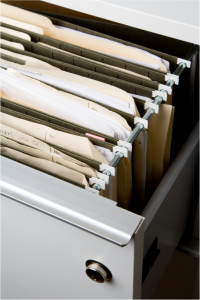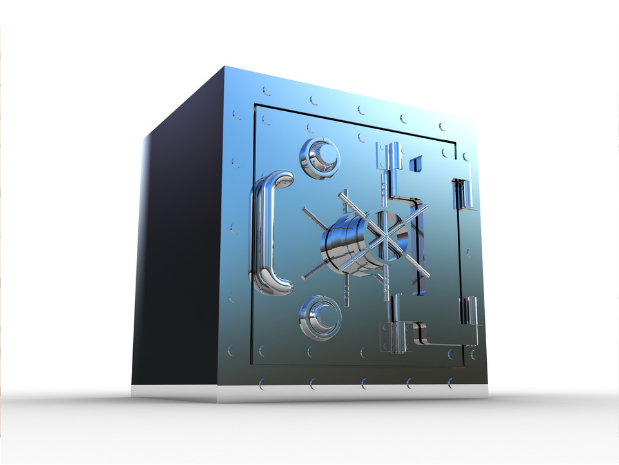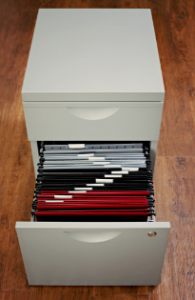
The Old-Fashioned Way
Although we are trending toward a paperless society, much of your life is probably on paper. Storing paper documents, passports, personal information such as birth certificates, marriage certificates, Social Security cards, military records, receipts and bills, vaccination records, and other files requires a lot of space and keeping them organized is a major undertaking. Not only that, but paper is easier to misplace, hard to keep secure and accessible at the same time, and could even be a fire hazard. Nevertheless, we all have a paper trail that needs storage.
If you own a business, you may also have paper files that the executor or next owner will need to access to. No matter what you are going to hand down, the major issues are what to keep, how to store and organize it, who to store it with, and who has access to it.
Another consideration is how many places you should keep copies of these documents. A home fire or a broken pipe may destroy your documents. It’s extra work to keep two sets of documents, but it could make a difference if calamity strikes.

Physical storage options and what to store
The best way to assure security and safety is in a safe or strongbox at home or safety deposit box in a bank (only if someone else has access to it as well). Some may have more documents or paper files than will fit in these locations; you would need to choose the most important ones that will be needed to settle your estate after you pass away. These should include your last will and testament or living trust document with any attachments, other legal documents, real estate records, and contracts. You may also want to keep the original copies of your Healthcare Proxy and Advanced Care Directive/Living Will in the same location.
You may want to keep the rest of your files in a locked file cabinet where they can stay organized, but easily accessible. Best not to keep them in desk drawers, boxes, or unlocked, non-fireproof file cabinets.
These are some of the other papers you will need to keep and for how long.
- Tax returns should also be kept until the estate is settled, although tax return documentation, such as W2 forms, only needs to be kept for six years.
- Canceled checks, bank deposit slips, bank statements need only be kept for seven years.
- Home improvement records and investment records should be kept during ownership and for seven years after they are sold.
- Keep the last pay stub of your previous job and the last pay stub of the year for your current job.
- Keep all mortgage payment checks (statements), student loan payments, car loan payment stubs, until they are paid off.
You do not need to keep:
- Credit card statements over three years old;
- Past insurance statements;
- Old utility bills, except the most recent bill from your previous address; or
- Recently paid bills (statements), once you have other documentation that they’ve been paid.
Business files may include:
- Deeds for property owned by your business;
- Inventories, assets, patents, and financial records;
- Accounts registered to your business;
- Mailing lists, newsletter subscription lists, or email lists containing your company’s clients;
- Client information, including customer history;
- Vendor information of companies your business deals with; and/or
- Any other contracts, such as landscaping, repairmen, or snow removal.
Where to keep them
The bulk of your less important files and documents can probably be stored at home or your place of business, but fires and other disasters are always a hazard. If you own a large, heavy fireproof/waterproof safe attached to the structure of your building you are probably secure keeping the original documents there. If not, you may want to consider other options such as:
- Your attorney’s office;
- May be convenient if you want to change your will or trust.

- The Revised Uniform Fiduciary Access to Digital Assets Act gives the attorney the right to access your digital assets if it doesn’t compromise your privacy.
- Other problems may occur, such as you may not be able to maintain the relationship, your lawyer retires, their law firm dissolves, or one of you moves.
- Local probate court or county clerk;
- It is hard to change a will that is only in that location.
- The will would not be available if you move.
- With you executor, possibly in a sealed envelope to avoid easy access; or
- A bank in a safety deposit box.
- This is only recommended if someone else, such as your executor, can access it if you cannot. It is important to do what is necessary to make sure the bank will continue to allow access to your executor after your death. If not, it may be secured after your death and require a court order to open it.
- Since safety deposit boxes are only accessible during banking hours, it is best not to store items that may be needed urgently in them, such as a passport or the only copy of your will and living will.
- Many big banks are no longer creating or leasing new safe deposit boxes and the reduction of local branches due to online banking and mergers may result in you having to travel farther to get a safe deposit box.
How to organize your information
Although this is a laborious process, it will save you and everyone else involved much more time in the long term. Essentially, you should set up your own filing system for storing important papers in a filing cabinet, drawer, or expanding file folder.
 Once in place, a well- organized filing system only requires a minimal amount of effort to maintain, and the time saved when you need to find this information is enormous.
Once in place, a well- organized filing system only requires a minimal amount of effort to maintain, and the time saved when you need to find this information is enormous.
For example, quickly finding the supporting documents when applying for Medicaid or Veterans Benefits can avoid additional delay in the application process and the resulting delay in receiving benefits.
The first step is to decide on what categories would best fit your paperwork and way of thinking.
Next, label folders or sections with these categories and place them in your chosen filing area.
Categories that are typically used include:
- Automobiles
- Bank Accounts
- Credit Cards
- Insurance (may be divided into types such as Health, Life, or Property)
- Medical Information
- Mortgage
- Personal
- Retirement
- Taxes
- Utilities
Add as many as you need to suit your needs. You may also want to have copies of your Healthcare Proxy and Advanced Care Directive/Living Will in your files in their own labeled file.
You will need to choose different categories for your business, such as:
- Accounts Received
- Client Information
- Contractor Information
- Contracts
- Billing
- Employees
- Insurance Policies
- Inventory
- Mailing Lists
- Patents
- Property Deeds
- Taxes
- Vendors
Few of us are capable of filing as we go, so your filing system needs a “To Be Filed” section.
- This is for information/documents you will not file right away, but don’t want to misplace.
- Try to get into a routine for filing those papers in their appropriate file. It might be when you are paying bills or any other interval you choose.
Maintenance also includes cleaning up your records as needed. Not all paperwork needs to be kept forever.
- To avoid unnecessary clutter, keep your records updated and condensed by getting rid of outdated files.
- There may be obvious times, such as when you file your taxes when you can replace this year with the tax form from 8 years ago.
